Unless otherwise noted, all films will be screened at 1:30-3:30 pm in the Allen Auditorium, on the first floor of the Allen Library.
Friday, April 13: Carved from the Heart, Ellen Frankenstein and Louise Brady, 1997 (30 min.) - CANCELLED
Please note the time change for this screening, 12:30-1:30 pm.
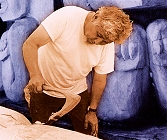
Discussion facilitated by Jim Green
After Stan Marsden lost his son to a cocaine overdose, he was at first incapacitated by grief, but a year later Stan, who is an Alaskan Tsimpsean wood carver, decided to create a totem pole in his son's memory. Before he was done, the pole had become a communal project, with the entire town of Craig taking part. Carved from the Heart intertwines the process of carving and erecting the Healing Heart totem pole with the participants' stories of personal loss, grief, substance abuse, suicide and violence.
Friday, May 18: The Mano River Sketches, slides & discussion of work-in-progress by Danny Hoffman
The Mano River Sketches is a project combining text and photographs from Sierra Leone and Liberia. Through an introductory essay and a series of text and image "sketches," the project explores how aesthetic choices inspired by the African image archive might present alternatives to the documentary realism of most photojournalism and visual ethnographic portrayals of this region.
Friday, May 25: The Bimo Records, Yang Rui, 2006 (91 min.)
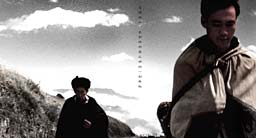
Discussion facilitated by Stevan Harrell & Tami Blumenfield
This stunning observational film by a Chinese filmmaker focuses on the lives of three Bimo clergy of the Yi people, one of the ethnic minorities living in the Da Liangshan Mountains of China. In this remote landscape, festivals and religious traditions remain an integral part of Yi life, and the Bimo clergy conduct rituals that bridge the worlds between mortals and ghosts. The old ways seem safe here, shrouded in the mist, but assimilation and modernity are eroding the traditional ways.
Responsibility for selecting a film, getting a copy of it to view, introducing it (i.e. explaining why you're interested in viewing it with the group), and leading a discussion on it will rotate between different members of the group. We hope this organization will help us sustain momentum and share different approaches to the question of "What is visual anthropology?" Please send recommendations for Spring 2007 to Sasha Welland (swelland@u.washington.edu).
Friday, January 5: The Gleaners and I
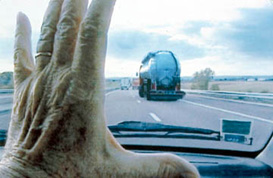
Friday, February 2: Three short films with discussion facilitated by Sam Yum
passing girl: riverside - An Essay on Camera Work, Kuame Braun, 1998 (24 min.)

At a street festival in West Africa, a young girl is delighted to discover a video camera trained on her. But her exuberant display is quickly cut short when she recognizes that the cameraman has already lost interest in her. But all is well: he has a document of the moment. Video has tipped the balance in another human interaction, and turned it into a curio. This experimental video essay probes the complexities of video as a tool for cross-cultural research and representation: it examines, in effect, the politics of its own production. How does the intrusion of this expensive technology distort relationships? What are the ethnographic filmmaker's responsibilites towards his "subjects?"
Babakiueria, Don Featherstone, 1986 (30 min.)
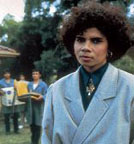
In 1988 Australia celebrated the 200th Anniversary of white European settlement in Australia. Babakiueria ("Barbecue Area") is light-hearted satire that reverses the roles, imagining what it would be like if a fleet arrived to try and settle an area inhabited by white natives.
Night Cries: A Rural Tragedy, Tracey Moffat, 1990 (19 min.)
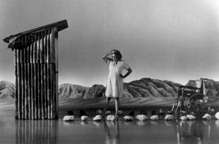
On an isolated, surreal Australian homestead, a middle-aged Aboriginal woman nurses her dying white mother. The adopted daughter's attentive gestures mask an almost palpable hostility. Their story alludes to the assimilation policy that forced Aboriginal children to be raised in white families. The stark, sensual drama unfolds without dialogue against vivid painted sets as the smooth crooning of an Aboriginal Christian singer provides ironic counterpoint. Moffatt's first 35mm film displays rare visual assurance and emotional power.
Friday, March 2: In Her Own Time: The Final Fieldwork of Babara Myerhoff, Lynne Littman, 1985 (60 min.)

In 1981, Professor Barbara Myerhoff began an anthropological study of the Fairfax district in Los Angeles. Fascinated by the influence of Orthodox Judaism in creating a community, she decided to make a film about this village in the heart of Los Angeles. In June of 1983, Dr. Myerhoff learned that she had cancer. She asked director Lynne Littman, with whom she had collaborated on the Academy Award-winning Number Our Days, to join the project, which she realized would probably be her last work. Throughout the research and filming of In Her Own Time, Dr. Myerhoff explored her own evolving relationship to Orthodox Judaism, revealing the continuing importance of religious traditions and practices for individuals and families today.
Last modified: 5/15/2007 10:04 AM